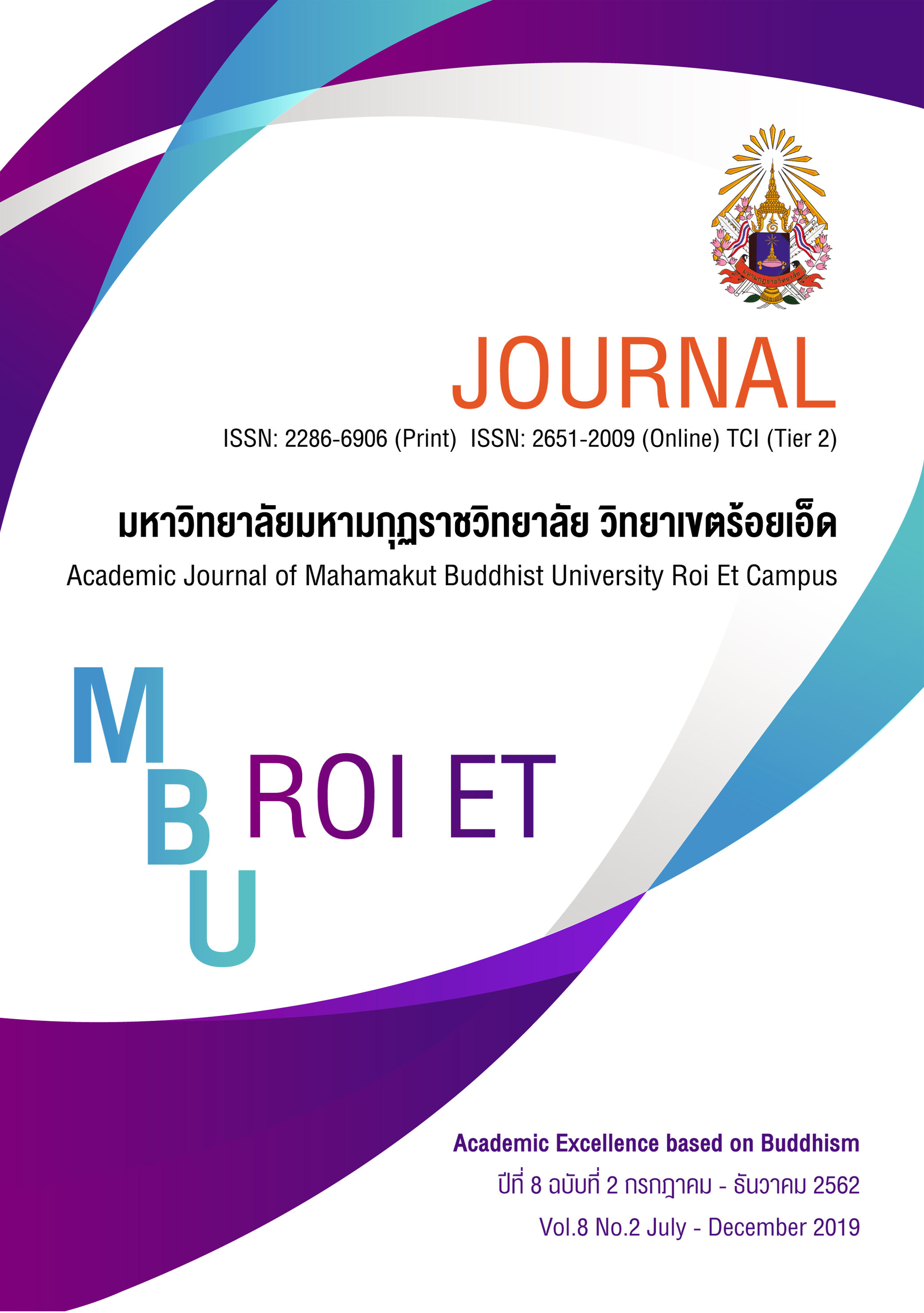Model for Enhancing Moral Virtues Based on Sufficiency Economy Philosophy of Primary Students of the Office of Mahasarakham Primary Education Service Area 1
Main Article Content
Abstract
The title was three objects, 1) to study elements and moral KPI according to philosophy of sufficiency economy for Primary school Students 2) to making model according to philosophy of sufficiency economy for Primary school Students and 3) to study of the result in use and assessment for moral model development according to philosophy of sufficiency economy . The methodology as followers: to group of Primary school Students, special leadership and 926 teachers from 197 schools of primary school educational area 1 of primary school students until 4-6 classroom of Bua Mart (Bua mart Chusilapa) in primary school educational office area 1 in term 2nd of educational year 2018, from 25 population. The methodology of this research as followers: Questionnaires, handbook for use model, assessment for specialist and Moral assessment form according to the philosophy of sufficiency economy of students before and after development. Statistics used in data analysis are mean, standard deviation. Confirmatory Factor Analysis.
The research was found that as followers;
1. The elementary and moral KPI according to philosophy of sufficiency economy for Primary school Students consists of four main elements and sub-elementary and sixty-four KPI with structure validity value. The structure and index was concerned by data. (2= 28.717, df = 24, P-Value = 0.126, CFI = 0.982, TLI = 0.994, SRMR = 0.015, RMSEA = 0.033)
2. The result of making moral model according to philosophy of sufficiency economy for primary school students which is used by the handbook for developing moral model that was related by 15 activities that was passed by assessment method and proved by 9 specialists. It was found that the result of assessment has suitable method for developing moral model of this theory of primary school students in total that has suitable method and higher marks levels.
3. The result of use and assessment for the developing moral model of primary school students was found that every students have ability to practice all activities by rule. In the pre-test, students have behavior marks in middle level, after was used this model, students become higher marks level according to this theory.
Article Details
References
แก้วเวียง นำนาผล และคณะ. (2557). ข้อเสนอเชิงนโยบายการพัฒนาคุณธรรมจริยธรรมเด็กไทย “โตไปไม่โกง”. กรุงเทพมหานคร : สำนักงานเลขาธิการวุฒิสภา.
จารุพงศ์ พลเดช. (2546). การบริหารแบบมีส่วนร่วมและการให้อำนาจ. วารสารพัฒนาชุมชน. 24(4) : ไม่มีเลขหน้า.
ชินวัตร บุปผาวัลย์. (2555). การพัฒนารูปแบบการเสริมสร้างคุณธรรม จริยธรรมของนักเรียนในโรงเรียนขนาดเล็กด้วยหลักการมีส่วนร่วม. วิทยานิพนธ์การศึกษาดุษฎีบัณฑิต. มหาสารคาม : มหาวิทยาลัยมหาสารคาม.
ธีระ รุญเจริญ. (2553). ความเป็นมืออาชีพในการจัดการและบริหารการศึกษายุคปฏิรูปการศึกษา (ฉบับปรับปรุง) เพื่อปฏิรูปรอบ 2 และการประเมินภายนอกรอบ 3. พิมพ์ครั้งที่ 6.กรุงเทพมหานคร : ข้าวฟ่าง.
ผกาวัลย์ ทองบุ และคณะ. (2556). การสร้างแบบวัดทักษะชีวิตสำหรับนักเรียนในระดับชั้นประถมศึกษาปีที่ 4. วารสารมหาวิทยาลัยราชภัฏมหาสารคาม(มนุษยศาสตร์และสังคมศาสตร์). 7(2). 141-150.
มนตรี อินตา. (2560). การพัฒนาโปรแกรมการฝึกอบรมตามแนวคิดการเรียนรู้เชิงประสบการณ์เพื่อเสริมสร้างการเรียนรู้ทางอารมณ์และสังคม. วิทยานิพนธ์การศึกษาดุษฎีบัณฑิต.มหาสารคาม : มหาวิทยาลัยมหาสารคาม.
รณวีร์ พาผล. (2556). การพัฒนาคุณธรรมจริยธรรมความมั่นคงทางอารมณ์เพื่อการบริโภคสื่อและข่าวสารอย่างชาญฉลาดของเยาวชนในแขวงนครพิงค์ จังหวัดเชียงใหม่. เชียงใหม่ : มหาวิทยาลัยราชภัฏเชียงใหม่.
สำนักงานคณะกรรมการพัฒนาการเศรษฐกิจและสังคมแห่งชาติ. (2555). น้อมนำสืบสานสู่วิถีพอเพียง. กรุงเทพมหานคร : ดาวฤกษ์ คอมมุนิเคชั่นส์.
สำนักงานเลขาธิการสภาการศึกษา กระทรวงศึกษาธิการ. (2553). แผนการศึกษาแห่งชาติ ฉบับปรับปรุง (พ.ศ. 2552-2559). กรุงเทพมหานคร : สำนักงานเลขาธิการสภาการศึกษา.
Kirk, R. E. Experimental. (1995). Design : Procedures For the Behavioral Sciences. 3rd ed. Pacific Grove, California : Brooks/Cole.


